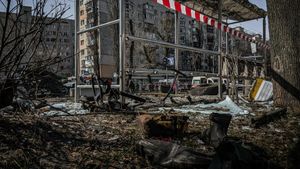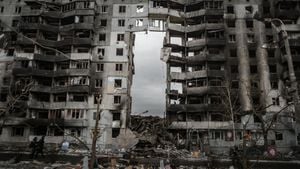Political tensions have escalated dramatically in the Philippines following alarming remarks made by Vice President Sara Duterte, which have sparked widespread concern for the safety of President Ferdinand Marcos Jr. Duterte, the daughter of former President Rodrigo Duterte, stated publicly during a press conference on Saturday, she had spoken to someone about having Marcos, his wife, and the Speaker of the Philippine House assassinated should anything happen to her.
"If I get killed, go kill BBM (Bongbong Marcos), Liza Araneta, and Martin Romualdez. No joke," Duterte declared, adding the explicit nature of her threat raised significant alarms within the government. The backlash and potential repercussions were immediate. Marcos' Presidential Security Command swiftly announced it has implemented heightened security measures for the president, categorizing Duterte's comments as "a matter of national security."
This high-profile incident highlights the growing rift between Duterte and Marcos, who were previously allies during the 2022 election campaign. The pair rode to power on promises of national unity but have since drifted apart over deeply entrenched policy disagreements. Both leaders gained significant popularity during their electoral campaign, but their partnership has frayed amid differing approaches to governance, particularly concerning foreign policy and how to handle pressing national security issues.
National Security Adviser Eduardo Ano reacted firmly, stating, "We will work closely with law enforcement and intelligence agencies to investigate the authenticity and origins of these threats." He emphasized, "Every threat to the president’s life is taken seriously and validated as such." The investigation could potentially lead to legal actions against Duterte if sufficient evidence is found.
During her heated comments, Duterte expressed her discontent with Marcos's leadership, describing him as incompetent and alleging he had lied to the public. "This country is going to hell because we are led by someone who doesn’t know how to be president," she said, reflecting sentiments echoed by other political figures who are disillusioned by the current administration's performance.
The controversy escalated after lawmakers called for the arrest of Duterte's chief of staff, Zuleika Lopez, over allegations of obstructing investigations related to the vice president's alleged misuse of public funds. This move appears to have triggered Duterte's bombastic statements and threats, which she framed as protective measures for herself.
While speaking to media, Duterte attempted to calm fears about her own safety by outlining her conversation with the purported hitman, emphasizing her instructions didn’t come lightly. "I am not joking about this. I said, ‘If I die, do not stop until you kill them.’" The gravity of her statements incited immediate condemnation from the president’s office and prompted calls for urgent protective measures.
"The Executive Secretary referred this clear and unequivocal active threat against our president to the Presidential Security Command for immediate actions," stated Lucas Bersamin, the Executive Secretary. He reiterated the importance of treating such threats with utmost seriousness. Following Duterte's statements, the police chief mandated investigations, pinpointing any direct threats to Marcos as requiring top priority under Philippine law.
What was once hailed as the dawning of a new political era now hangs precariously, as it appears to be on the verge of unraveling due to bitter personal and political animosities. Sara Duterte had previously served as Marcos's education secretary but resigned amid the growing tensions and criticisms directed at the administration.
While implementing investigations, government officials stress the need for vigilance, as they work to maintain stability amid increasing tensions. The Philippine National Police has already started gathering information to assess the risk level posed to the president and has initiated measures to protect both him and his family as they follow through on heightened security protocols.
Public confidence is now teetering as both leaders grapple with their fractured alliance, wrestling with public expectations and the dire need for effective governance. The political fallout is bound to draw scrutiny from various sectors, particularly as the Philippines navigates complex foreign relations, especially with neighboring powers like China.
The president’s credibility is also at stake as this incident highlights potential vulnerabilities within his administration, contributing to the possibility of deepening fractures within the political elite, something constituents are already calling attention to as they become more involved and concerned about their government leaders and their actions.
The tension between Duterte and Marcos is symptomatic of broader issues facing the Philippines, including governance challenges and the public's growing frustration over slow progress on key issues, including inflation and public health recoveries post-pandemic. With both politicians expressing their strong opinions publicly, the stakes are high as their political rivalry potentially reaches dangerous levels.
Fears linger over the next steps and if any legal measures will be pursued against Sara Duterte, who remains steadfast amid increasing backlash. She has continued to defend her statements as expressions of protective instinct and loyalty to her team amid attempts to discredit her leadership. But with the national security interests at the forefront, all eyes are glued to how this broiling situation will evolve and impact the future climate of Philippine politics.
The Philippines has seen its share of turbulent political landscapes, and once again, it faces the possibility of upheaval. What remains clear is the expectation of accountability and change, as citizens navigate their leaders’ potentially increasingly dangerous power struggles.



